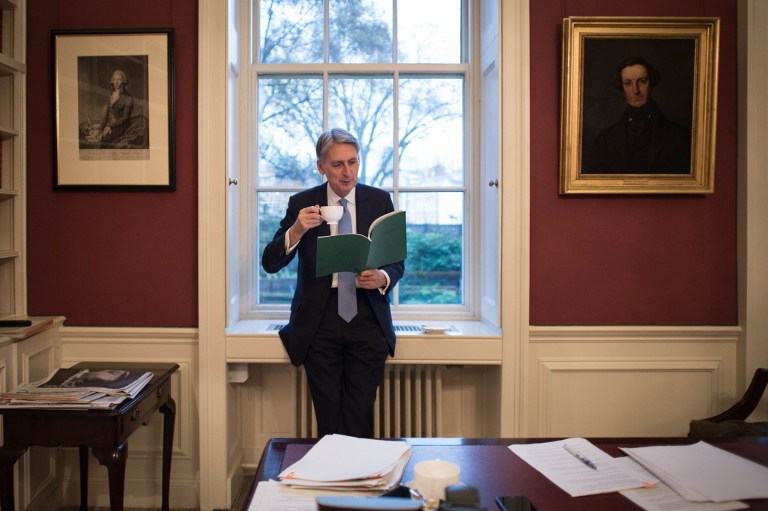
Britain on Wednesday delivers its first budget since the Brexit referendum, with economists expecting a slight shift away from years of austerity as the nation readies its EU exit strategy. The Conservative government’s finance minister Philip Hammond will deliver his so-called Autumn Statement before parliament around 1230 GMT Wednesday — exactly five months after the Brexit vote. / AFP PHOTO / POOL / Stefan Rousseau
LONDON, United Kingdom (AFP) – by Roland JACKSON Ben PERRY
Brexit will spark an economic slowdown and ravage public finances, forcing a multi-billion-pound spike in state borrowing over the next five years, a gloomy mini-budget revealed Wednesday.
Britain is predicted to borrow an extra £122 billion ($152 billion, 143 billion euros) in the period to 2021, according to official forecasts from the Office for Budget Responsibility.
About half of that budget black hole — or £58.7 billion — is a direct consequence of Britain’s decision to leave the European Union, according to the OBR, which blamed factors including lower migration, slower productivity growth and higher inflation.
The nation’s EU exit vote will “change the course of Britain’s history”, finance minister Philip Hammond told parliament in the government’s first budget statement since the shock referendum that was held exactly five months ago.
Brexit “makes more urgent than ever the need to tackle our economy’s long-term weaknesses”, the chancellor of the exchequer told MPs in his so-called Autumn Statement.
Following slightly better-than-expected growth this year, gross domestic product was expected to expand by just 1.4 percent in 2017.
That marked a drastic downgrade from the prior estimate of 2.2 percent.
“That is slower of course than we would wish, but still equivalent to the IMF’s forecast for Germany, and higher than the forecast for growth in many of our European neighbours, including France and Italy,” Hammond told lawmakers.
Aside from Brexit, the OBR also highlighted the effects of the government’s easing of austerity measures on borrowing levels.
ING economist James Knightley said the chancellor had been handed “little room for manoeuvre”.
“Hammond has delivered an autumn budget statement that highlights the damage that Brexit will likely cause,” Knightley added.
In a keenly-awaited budget, Hammond unveiled a package of UK-wide investment projects, including the building of homes and road improvements.
He also raised the country’s minimum wage level and hiked tax thresholds to give workers more take-home pay.
‘Uncertainty’
While viewed as a government attempt to let up after years of austerity triggered by the 2008 global financial crisis, Hammond confirmed he had abandoned predecessor George Osborne’s aim of a budget surplus by 2019/20.
“In view of the uncertainty facing the economy, and in the face of slower growth forecasts, we no longer seek to deliver a surplus in 2019-20,” Hammond said.
John McDonnell, economy spokesman for the main opposition Labour Party, was scathing in response.
“We now face Brexit, the greatest economic challenge of a generation, and we face it unprepared and ill-equipped,” McDonnell told a rowdy parliament.
The British economy has remained resilient since the referendum, even as a cut in the Bank of England’s main interest rate to a record-low 0.25 percent has contributed to a slump in the pound.
Hammond said the projected growth slowdown was due to “lower investment and weaker consumer demand, driven … by greater uncertainty and by higher inflation resulting from sterling depreciation”.
Some experts have warned that a heavy blow could fall on the UK economy once divorce proceedings with the rest of the EU begin.
Prime Minister Theresa May has vowed to trigger Britain’s exit from the European Union by the end of March by activating Article 50 of the EU’s Lisbon Treaty, which begins a two-year countdown to leaving the bloc.
Among his key tax-and-spend pledges, Hammond announced a £1.4-billion investment to help build 40,000 “affordable” homes.
He outlined plans to ban certain costs incurred by renters of residential properties.
The chancellor also announced a rise in the minimum wage to £7.50 an hour in April from £7.20.
And he confirmed a plan to cut corporation tax to 17 percent by 2020 from the current 20 percent.
Over the weekend, May announced fresh investment in research and development, hiking it by £2 billion annually until 2020.








